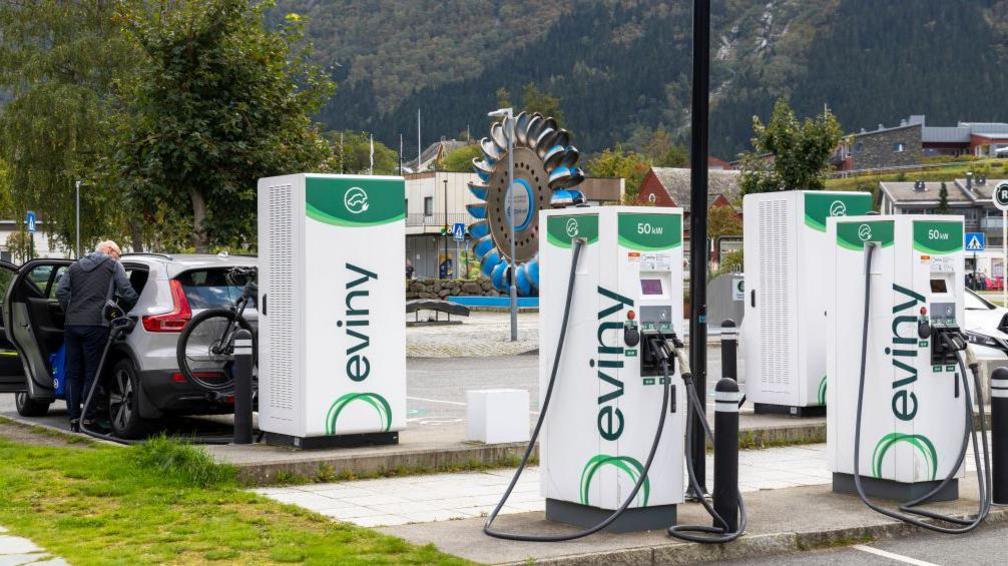Norway is leading the world in electric car adoption, with EVs accounting for 90% of new vehicles sold in the country last year. Can other nations follow its example?
Harald A Møller, a car dealership based in Oslo that has been importing Volkswagens for over 75 years, made a major shift in early 2024: it bid farewell to fossil fuel cars. Today, every passenger vehicle in its showroom is electric (EV). “We think it’s wrong to advise a customer to buy an internal combustion engine (ICE) car, because the future is electric,” says CEO Ulf Tore Hekneby, as he walks through the showroom. In Oslo, battery-powered cars have become the norm, with nearly every other vehicle sporting an “E” for “electric” on its license plate.
With a population of 5.5 million, Norway has embraced EVs faster than any other nation and is on track to become the first to phase out new fossil fuel cars. Last year, electric vehicles outnumbered petrol-powered cars on Norwegian roads for the first time. When diesel vehicles are included, EVs now make up nearly a third of the total cars in the country. In 2024, 88.9% of all new cars sold were electric, up from 82.4% the previous year. In some months, EV sales reached as high as 98%, while petrol and diesel car purchases nearly disappeared.
In comparison, electric cars made up just 20% of new car registrations in the UK in 2024, up from 16.5% in 2023, and only 8% in the US. Norway’s success, however, is the result of more than 30 years of deliberate planning and policy.
“It started in the early 1990s,” explains Christina Bu, Secretary General of the Norwegian EV Association, as she takes me for a drive around Oslo in an electric minivan. The government began taxing petrol and diesel cars more heavily while offering tax exemptions and incentives for electric vehicles (EVs). These policies initially aimed to support Norwegian EV manufacturers like the Buddy and TH!NK City, but even after those companies went out of business, the incentives remained in place.
“It’s our goal to ensure that choosing a zero-emission car is always a good and viable choice,” says Norway’s Deputy Transport Minister, Cecilie Knibe Kroglund. Despite being a major oil and gas producer, Norway plans to make all new cars sold “zero emission” by 2025, a non-binding target first set in 2017. Kroglund believes the country is on track to meet this goal, especially for passenger vehicles.
The success of Norway’s EV transition lies in long-term, predictable policies that have steered consumer behavior without outright banning combustion engine vehicles. Instead, higher taxes on fossil-fuel cars, along with the removal of VAT and import duties on EVs, have incentivized the switch. Additionally, perks such as free parking, discounted tolls, and access to bus lanes have further encouraged adoption.
Norway’s approach contrasts with the European Union’s plan to ban new fossil-fuel car sales by 2035, and the UK’s 2030 ban on petrol and diesel cars. While sales of petrol and diesel vehicles are still legal in Norway, few people are choosing them. For many, like Ståle Fyen, who bought his first EV 15 months ago, the financial incentives made the switch an obvious choice. “With no taxes on EVs, it was financially important,” he says, charging his car at a station in Oslo. The country’s extensive charging infrastructure also helps mitigate concerns, even in cold weather, when range is reduced by about 20%.
Merete Eggesbø, one of the first Norwegians to own a Tesla in 2014, says her decision was driven by a desire to reduce pollution. In fact, many petrol stations have now been replaced by fast-charging points, and there are now over 27,000 public chargers in Norway—a stark contrast to the UK’s 73,699 chargers, despite the UK having a population 12 times larger. This means Norway has 447 chargers per 100,000 people, compared to the UK’s 89.
Tesla, Volkswagen, and Toyota were the top-selling EV brands in Norway last year. Meanwhile, Chinese manufacturers like MG, BYD, Polestar, and XPeng now represent 10% of the market. Unlike the US and EU, Norway has not imposed tariffs on Chinese EV imports.
Christina Bu believes there’s no reason why other countries couldn’t replicate Norway’s success. “It’s all about finding the right policies for each market,” she says, noting that Norwegians aren’t necessarily more environmentally-minded than people elsewhere. “It’s about strong policies and gradually helping people understand that driving an electric car is possible.”
Norway’s wealth, bolstered by its oil and gas exports, gives it the financial means to invest in infrastructure and absorb the loss of tax revenue from petrol and diesel cars. Additionally, its abundant renewable hydroelectric power, which accounts for 88% of the country’s electricity production, makes EV adoption even more environmentally friendly.
“Within a few years, more than 50% of cars will be electric,” says Kjell Werner Johansen from the Norwegian Centre for Transport Research. “I don’t know anyone who wants to buy a diesel car these days.”











More Stories
Trump Announces Drug Pricing Deals to Cut Cost of Weight-Loss Medications
Poor Engineering Led to Titan Submersible Implosion, Say US Authorities
Nvidia Boss Predicts UK Will Become an “AI Superpower” as Tech Giants Pledge Billions